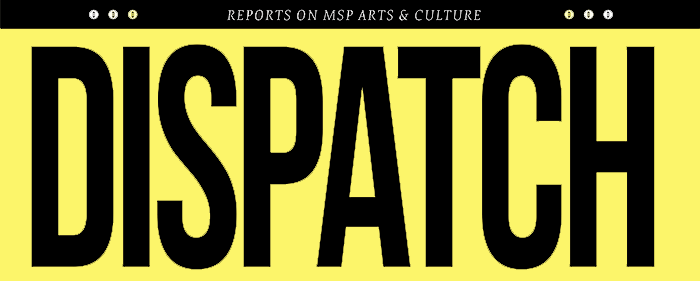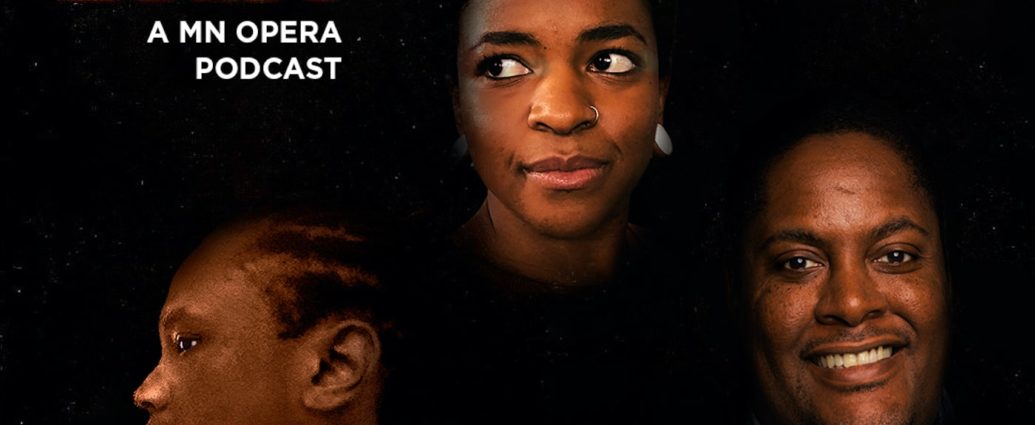The Score podcast is one outcome of the Minnesota Opera’s commitment to promoting equity, diversity and inclusion. Hosted by three Black, queer artists and staff members, the podcast explores opera from an anti-racist, anti-oppressive lens, bringing in voices and perspectives from within the organization and across the country to discuss the art form’s past, present, and future. It’s an incredibly fun show; colleagues Lee Bynum, Vice President of Impact, Paige Reynolds, Civic Engagement Manager, and Rocky Jones, Equity, Diversity, and Inclusion Director, share a rapport that is equal parts academic and informal. They invite listeners in with personal anecdotes and insightful commentary on the local and national news that bleeds into opera as much as it does our own lives.
Ahead of the launch for MN Opera’s new run of Carmen, Jones answered a couple questions for us about both the podcast and opera’s future.
Dispatch: Podcast discussions constantly connect topics of race, politics, class, evolution of society, even student loans! Why is opera such a perfect catalyst for exploring these intersecting issues?
Jones: I think the arts in general have always been a way to hold up a mirror to our society, so I think in that sense, opera, with all its grandeur and volume, is probably the biggest mirror you could ever find.
So often opera is dismissed as antiquated or irrelevant, but opera is musical storytelling on the grandest of scales and even hundreds of years ago, composers and librettists were creating pieces that not only spoke to universal themes like love, death, sex, jealously, betrayal, etc., but also were pretty explicit examinations of the political issues of their times. Many of those issues still resonate today. If you look beyond the pretty music, The Marriage of Figaro is all about class struggles and wealth inequality. And if La bohéme had been written today, I can imagine all those struggling twenty-somethings getting together to sing an aria about canceling student debt. And what’s more relatable than that in 2022?
But what we’re most interested in on The Score is looking at opera with an eye to present and the future. We’re three Black, queer artists working in this industry, who understand that the opera house has been a space of exclusion for so many people like us. I think when a lot of people imagine opera today it’s all divas and powdered wigs and expensive stories told solely for the amusement of rich, white people, but it’s so much more. There are so many incredible artists out there creating a new canon and telling stories for the 21st century that center the struggles and the joys of BIPOC folks, queer folks, trans and non-binary folks, disabled folks, etc. Who are bringing their own cultural and musical traditions into the art form. There are operas being mounted right now that speak to the climate crisis, immigration, police violence and other issues we’re facing in 2022. So we are excited to be able to talk to the artists who are doing that work here and now and, in the process, hopefully inspire the next generation of artists to feel like they have a place in opera and so do the traditions, stories, and issues that matter to them.
Dispatch: Do you see any differences in how the Twin Cities approaches the promotion of EDI compared to other opera companies? What are the unique challenges we face?
Jones: I think the events of the last few years have once again opened everyone’s eyes to the insidiousness of structural racism and oppression in so many areas of our daily lives: law enforcement, voting rights, medical racism, etc. The list unfortunately goes on. These are global problems that affect every community and every industry and the arts are no different. Back in 2016, Minnesota Opera became one of the first American opera companies to start looking our
systems, policies and procedures through an EDI lens, based on the premise that we’re more than an arts organization. We’re a civic institution and as such, we have the responsibility to create a space of authentic belonging for all Minnesotans. And since then – from the stories we produce, to the artists who produce them, and the staff members who keep everything moving – we have endeavored to create a Minnesota Opera that more accurately reflects the community we live in.
But, of course, that hasn’t come without challenges, and I’d say that the biggest challenge came in the wake of George Floyd’s murder and the subsequent uprisings, when all of us in the Twin Cities found ourselves at the epicenter of a reinvigorated global movement for racial justice. I think, given the history of opera in general, people found it hard to trust our intentions and the spotlight that was already on us as one of the companies out in front of the EDI conversation, just got even brighter. We didn’t have the luxury of talking the talk and not walking the walk. So, we kind of took that spotlight and decided to lean into it. Among many other things, we’ve instituted a robust anti-racism curriculum for our staff. We’re constantly auditing our policies and procedures like hiring and budgeting and repertoire selection, looking for ways to be more equitable and inclusive in our practice. We’ve adopted a charter that commits us to bringing all of our work in every department into alignment with anti-racist and anti-oppressive values. And we’re seeing some exciting results. In 2016, the percentage of total staff members who identified as BIPOC stood at 4% and leadership staff specifically stood at 0%. Now in 2022, it’s 30% and 27% respectively. To me, that’s pretty cool. We’re building that trust and becoming a place where BIPOC folks feel safe coming to work and feel a sense of real belonging. And it’s been really heartening to see the way other companies all over the country are seeing that there are not only financial and ethical cases to be made for this work, but also an artistic case, so they’re embarking on their own EDI journeys. And activist groups like the Black Opera Alliance and the Asian Opera Alliance are bringing new conversations and ideas to the fore. I’ve even been contacted by companies outside the US. So all of that makes me really excited for the future.
Dispatch: A favorite segment is Fire the Canon, where you discuss whether or not an opera is too out of touch to continue producing. The MN Opera is tackling one of these in the 2022-23 season, Don Giovanni, but is owning the story under the leadership of an all-women creative team. Do you see this practice of challenging and re-envisioning traditional operas being taken up more frequently? Has anyone else done it particularly well recently?
Jones: The aim of “Fire the Canon” is ultimately to be a bit irreverent. We’re not trying to tell anyone what they can or can’t produce or enjoy, and we’re certainly not trying to stifle anyone’s artistic imagination. But given the racism, misogyny, and problematic storylines present in some of the operas we’ve talked about, we’re just asking if there are ways to make those particular stories relevant in 2022. What I always say about my work is that my goal is to help create more joy for more people more of the time, and so I feel like if we’re going to talk about creating a more inclusive opera, then we have to reckon with some of the more problematic aspects of those works. We can’t hide behind the idea that they’re just “products of their times” and keep it moving. It’s irresponsible (to put it mildly).
But what’s really interesting is that, as we are expanding the definition of opera and increasing the number of people who have access to and ownership of the art form, more and more we’re seeing a lot of fresh, modern perspectives on old stories. So I think it’s totally possible to tell a story like Don Giovanni in a new way and that’s exciting. I want to encourage artists to take risks, try new things and expand the boundaries. I mean Paris Opera did La bohéme in space a few years ago. Anything is possible, right? But I think at the end of the day, we’re talking about “Nothing about us, without us” right? So if you’re doing a production about Black or Asian people for instance, you need to have Black and Asian people in the room with the power to make decisions that actually affect outcomes. But even with the best of intentions, we know that there are some stories that can just be downright offensive in the current climate, so we’re just encouraging folks to look at some of these traditional pieces with a more critical eye and recognize that, if you don’t have a fresh take or you can’t do it responsibly, it might be time to try something else.
Dispatch: We’re all hopefully this year will bring some regularity back to in-person performances. How do you see the podcast evolving this year?
Jones: Well, it’s been a scary, isolating couple of years for sure, but an unexpected silver lining of having to record the podcast remotely has been the ability to patch in guests from all over the world, so we’ve been able to meet people we might not have otherwise. But man do I miss recording in person. It’s just a different vibe. So to your point, I do hope we get to do that again someday soon and maybe even a live show with an audience!
But as far as other stuff goes, when I first sat down with Paige and Lee to brainstorm ideas about what The Score could be, we all agreed that we wanted to create safe, fun, comfortable space that inspires more people like us to check out this big, loud, fantastical art form we all love from all the different angles, so I just hope we can continue to cultivating this
little community we’ve got going. As a non-native Minnesotan, I don’t think people outside of the state realize what a vibrant, forward-thinking community of artists we have here or how much Minnesotans truly respect and value their artists. I would love to have more discussions about the state of arts education and funding, because that’s the future of our industry right there and there’s so much to talk about and learn from the advocates and politicians doing that work here. Ultimately, however, my hope is that we can continue to spotlight an even greater diversity of underrepresented artists doing such amazing things here and around the world and light a spark of creation and justice and hope that radiates out to the rest of the world.
The Score is available wherever you get your podcasts, and the MN Opera’s new run of Carmen kicks off May 7th.


Comments are closed, but trackbacks and pingbacks are open.